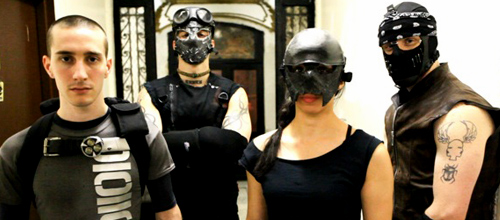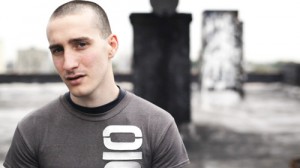
Queen Lantern

Gay superhero Zimmer Barnes
by Lawrence Ferber
Last year’s Kick-Ass saw a high school comic-book nerd don an improvised superhero outfit and take to the streets to fight crime (albeit, as the title indicates, getting his ass kicked plenty in the process). This year’s satirical Super also saw an ordinary schlub take matters—and a wrench—into his own homemade costumed hands, playing heroic vigilante “Crimson Bolt” with a psychotic Ellen Page as sidekick to boot. However, director Michael Barnett and openly gay producer Theodore James learned that this concept of everyday folks taking to the streets as real-life crime fighters and altruistic guardians isn’t a fictitious one: there are several hundred real-life superheroes registered in online communities, almost a dozen of whom are profiled in their documentary, Superheroes, which makes its national broadcast debut via HBO on August 8 at 8 p.m. (central time).
One is openly gay Zimmer Barnes, aka “Zimmer,” member of the Brooklyn-based “fantastic foursome” New York Initiative, which is seen in the documentary attempting to bait and get righteous on local homophobes, helping patch up accident victims (Zimmer’s an EMT), and stop a would-be drunk—and we’re talking seriously wasted—driver from getting behind the wheel.
Born in Victoria, Texas, in 1988, and having attended high school in Austin from 2003–2006, Zimmer moved to Brooklyn in 2009 and formed the NYI with roommates T.S.A.F, Z, and Lucid. Zimmer spoke by phone about being part of the documentary, how this real-life superhero movement started (it was a group of LGBTs!), and whether It Gets Better with a costumed alter-ego.
Lawrence Ferber: When did you first become inspired to become Zimmer the superhero? What triggered the epiphany?
Zimmer Barnes: I read a news article in 2003 or so about another crime fighter, Terrifica. She’d been date-raped and didn’t want any woman to suffer that ordeal, so she would go into bars and interfere with guys trying to pick up drunk girls. She would get in the way and tell the guy, This girl isn’t going home with you, and she would do this in a gold-sequined mask and red cape. She’d give that woman every chance she could to get away, and in one interview she said a lot of times girls would say, “I’m not being taken advantage of, I want to do this,” and then she would give them a condom and say, “At least make a bad decision not be a worse decision” and leave them alone. That was amazing to me. In her spare time she was doing this incredible thing, and that really resonated with me. There were a lot of people doing their own thing in every corner of the world, and it was something I wanted to be a part of.
How did you and the NYI become part of Superheroes?
We were getting some media requests and turned down a lot of them. But it was TJ, the producer, who contacted me, and I agreed to sit down with him and Mike—they convinced me they had good intentions. We met at a coffee shop in Brooklyn, and at one point I left Mike and TJ to talk amongst themselves, but what they didn’t know was that my NYI colleagues were sitting behind them listening to what they were saying. We learned that even when they had the opportunity to talk behind my back, they didn’t say anything negative. So that’s the reason we decided to do the documentary.
What was the actual shooting process like, and what sort of accommodations did you have to make to let them bring cameras along on patrols and fag basher-baiting operations?
We weren’t always patient with that process, but Mike was really innovative. His approach and how he was going to shoot these un-shootable scenes, it worked out for the best. There’s something actually called Hero Cam—it’s a waterproof HD cam—and I had that on a chest strap for a lot of missions. It’s just about the size of a pager or cellphone. It was a unique experience.
What sorts of things didn’t make it into the documentary, and what else is NYI up to these days?
A lot of stuff ended up on the editing room floor. We do a lot of outreach to homeless organizations—people live underneath a tunnel in the Bronx, and we brought supplies to them, and that didn’t make it in. Because in New York it gets freezing during winter, we try to collect and hoard blankets and medical supplies throughout spring and fall, and when it gets cold we try to hand out all that stuff. Today the NYI is undergoing several missions protecting the West Village from muggers and providing self-defense information and outreach to sex workers. We’ve got exciting stuff in the works, but I can’t talk about it yet.

I don’t think it fits in a huge way. It’s never been a secret. I came out in high school. I didn’t necessarily want to be an embodiment or speak for an entire community, but it’s something I’ve never made a secret of.
How would you feel about a gay teen who takes on school bullies and fag bashers a la Kick-Ass instead of just the pacifistic “It Gets Better” approach?
While everyone’s situation is different, I strongly recommend to anyone who might be a victim of violence to have a strong education in self-defense. I’ve broken up dozens of fights and defended myself from blows without ever having to throw a punch—so far, anyways. But that doesn’t mean I don’t practice. Speak respectfully and pack a knock-out punch.
Which comic book superhero do you feel is the most inspiring for LGBTs?
Chris Claremont’s 1970–1980s run on X-Men is a great read for anyone feeling different or an outcast. There’s a lot to be said for geek culture being ahead of the curve, and Claremont really nails it on diversity as a strength, not a weakness. If you want to read greatly written LGBT characters, I highly recommend Ed Brubaker’s and Will Pfeifer’s run on Catwoman as well as Gail Simone’s Secret Six.
Are other LGBT people doing what you’re doing?
Yeah, there are. The earliest [superhero group] we know of was actually a gay and lesbian group in San Francisco, the Lavender Panthers. There was a lot of gay bashing going on, and [a gay Pentecostal Evangelist named] Rev. Ray Broshears was being harassed. The police didn’t do anything, so they formed their own group and looked around for gay bashings and handled it. It’s not something I would believe—it sounds like a comic book—but Time magazine did an article on these guys in 1973 (which you can read online at www.time.com/time/magazine/article/0,9171,908008,00.html). They were around before the Guardian Angels. As far as I know, they were the original group.
Do your friends and family know about your alter-ego?
I don’t have an alter-ego. Zimmer is my real first name. I don’t have a lot of secrets with friends. My friends are pretty weird. My mother is an attorney and her mother was a police officer, so criminal justice as a career is part of the family. I think my mom was supportive of it.
And boyfriends?
I was dating during the course of making the documentary. We broke up and [my work as superhero] was one of the reasons why. They were really worried about what I was doing and the more dangerous aspects.
And what do you want people who watch Superheroes to come away from the experience with?
I want people to realize that even a single person’s effort and passion can make a huge impact. There’s something exciting about using your time and energy to help other people.
Lawrence Ferber is a frequent contributor to OutSmart magazine.











Comments